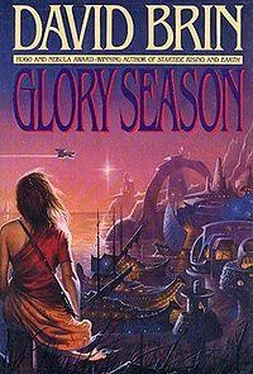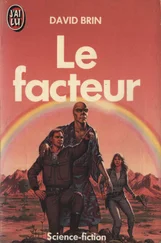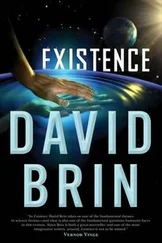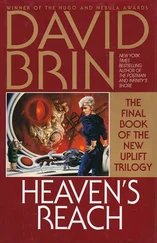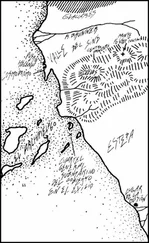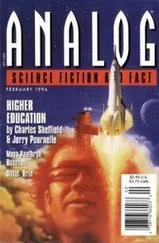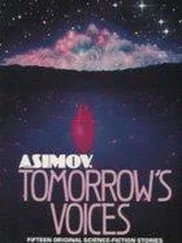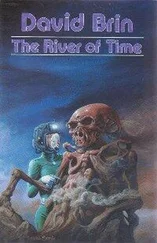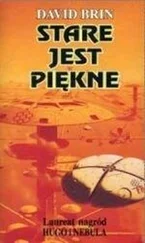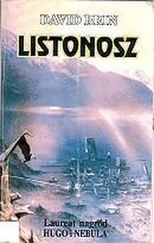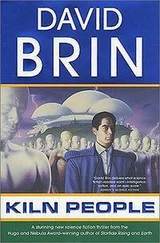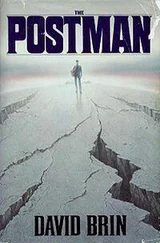It was the final irony. She faced the challenges of independence willingly, equipped, to stand on her own, while at the same time ready to share her heart. It seemed a natural stage in her personal renaissance, cresting from adolescence to true adulthood.
Stratos might take a while longer, but worlds, too, must waken from dreamy illusions of constancy. The cradle built by Lysos no longer protected, but constrained.
Reaching a turn in the road, Maia came upon an overlook facing west. There, slowly setting beyond the mountains, was the great nebula that Stratoins called the Claw—known in Phylum space as God’s Brow. Somewhere in the cold, empty reaches between, vast crystalline ships were bearing down to finish an isolation that Lysos must have known would end, in time. Only then would it become clear if humans had achieved a kind of wisdom here, a new pattern of life worthy of adding to a greater whole.
Suddenly, the surroundings were illuminated by a sharp glow from above. Maia turned to look upward, where a single, starlike glimmer pulsed, throbbing rhythmically as it brightened, until it shone more radiant than any moon, or even summer’s beacon, Wengel Star. Wave-like patterns of color stabbed her eye, causing her to squint in wonder.
At first, Maia felt she had this marvel to herself, amid a city of a hundred thousand souls. Then came sounds—doors banging open, people flooding out of houses and holds, murmuring as they faced skyward and stared. Women, children, and the occasional man, spilled into the streets, pointing at the heavens, some fearfully, others in growing awe.
It took hours before anyone was certain, but by dawn all could tell. The spark was moving away. Leaving the folk of Stratos alone again.
For a time.
This book began with a contemplation of lizards. Specifically, several species from the American Southwest that reproduce parthenogenetically—mothers giving birth to daughter clones. Perfect copies of themselves.
From there, I discovered aphids, tiny insects blessed with two modes of reproduction. During periods of plenty and stability, they self-clone, churning out multiple duplicates like little Xerox machines. But when the good times end, they quickly swing back to old-fashioned sexual mating, creating daughters and sons whose imperfect variety is nature’s mortar of survival.
These miracles of diversity prompted me to wonder, “What if humans could do the same?”
The idea of cloning has been explored widely in fiction, but always in terms of medical technology involving complex machinery, a dilettante obsession for the very rich. This may serve a pampered, self-obsessed class for a while, but it’s hardly a process any species could rely on over the long haul, through bad times as well as good. Not a way of life, machine-assisted cloning is the biosocial counterpart of a hobby.
What if, instead, self-cloning were just another of the many startling capabilities of the human womb? An interesting premise. But then, only female humans have wombs, so a contemplation of cloning became a novel about drastically altered relations between the sexes. Most aspects to the society of planet Stratos arose out of this one idea.
These days, nothing is politically neutral. The lizards I referred to earlier have recently been cited in a thought-provoking, if inflammatory, radical feminist tract posing the question “Who needs males, anyway?” Many times, over the ages, insurgent female philosophers have proposed independence through separation. Given the plight of countless women and children in the world, they can hardly be blamed. In fact, the name “Perkinite” was taken from Charlotte Perkins Oilman, whose novel Herland is one of the best and pithiest separationist Utopias ever penned. Her brand of sexual isolationism is far gentler than the extremist doctrine I depict, which shamefully misuses her name on planet Stratos.
Unfortunately for gender segregationists—though not, perhaps, for men—biology appears to thwart simplistic secession. Mammals seem to require a male component at a deeper level than do insects, fish, or reptiles. Recent studies indicate that “male-processed genes” initiate important fetal-development processes. So even if self-cloning without machines became possible, conception might still require at least cursory involvement by a man.
Anyway, stories excluding men altogether seem almost as bombastic as those that crudely turn the tables, in naive role-reversal fantasies. (Amazon warriors, dueling over harems of huge but meek bimbo-males? The sub-genre is a dandy source of giggles, but bears no relation to the way biology works in this universe.)
On the other hand, there are no scientific reasons not to show males relegated to the sidelines of history, a peripheral social class, as has all too often been the lot of women in our own civilization. Men are still men on Stratos, give or take some alterations. Their society isn’t designed purposely to oppress them, only to end the age-old domineering and strife that accompanied patriarchy. In consequence, the folk of Stratos miss some of the joys we seek (and sometimes find) in monogamous family life. They also avoid much familiar pain.
Would self-cloning lead kinship lineages to imitate the social life of ants or bees, dwelling in “hives” with like-gened sisters? This notion, too, has been explored before, often by cramming antlike behavior into bipedal bodies. On Stratos, the daughters of an ancient clan would exhibit solidarity and self-knowledge unimaginable to vars like ourselves, but that wouldn’t necessarily make them automatons, or stop them being human.
Try to look at it from their point of view. Our world of nearly infinite sexual-genetic variation might seem too chaotic to be civilized. A society of vars would be inherently incapable of planning beyond a single generation—which is exactly our problem today, according to many contemporary critics. Too much sameness may be stifling on fictional Stratos, but too little sense of continuity may be killing the real Earth of here and now.
* * *
Some may accuse me of preaching that genes are destiny. Far from it. Men and women are ingenious, marvelously self-trainable creatures. Stratoin society is as much a matter of social evolution as it is of bioengineering. One of the lessons of Maia’s adventure is that no plan, no system or stereotype, can suppress an individual who is boldly determined to be different.
At the opposite extreme, some early readers said, “Women are inherently cooperative. They would never compete the way you depict.” I reply by referring to the works of animal behavioralist Sarah Blaffer Hardy (author of The Woman That Never Evolved ) and other researchers who show that competitiveness is just as common in the female as the male. Women have good reason to differ from men in style , but one would have to be blind to say their world is free of struggle. The intent of Stratos Colony was to craft a society in which natural feedback mechanisms temper inevitable outbursts of egotism. Its founders sought to maximize happiness and minimize violent disruption. Maia’s exploits are exceptions, occurring in a time of unusual stress, but they do illustrate that a culture based on pastoral changelessness has drawbacks all its own.
In other words, I penned Stratos Colony as neither Utopia nor dystopia. Many Westerners would find the place boring, but no more unjust than our world. While I hope my descendants live in a nicer place, few male-led cultures on Earth have done as well.
That sentiment notwithstanding, it is dangerous these days for a male to write even glancingly on feminist themes. Did anyone attack Margaret Atwood’s right to extrapolate religio-machismo in The Handmaid’s Tale ? Women writers appear vouchsafed insight into the souls of men—credit that seldom flows the other way. It is a sexist and offensive assumption, which does not advance understanding.
Читать дальше
